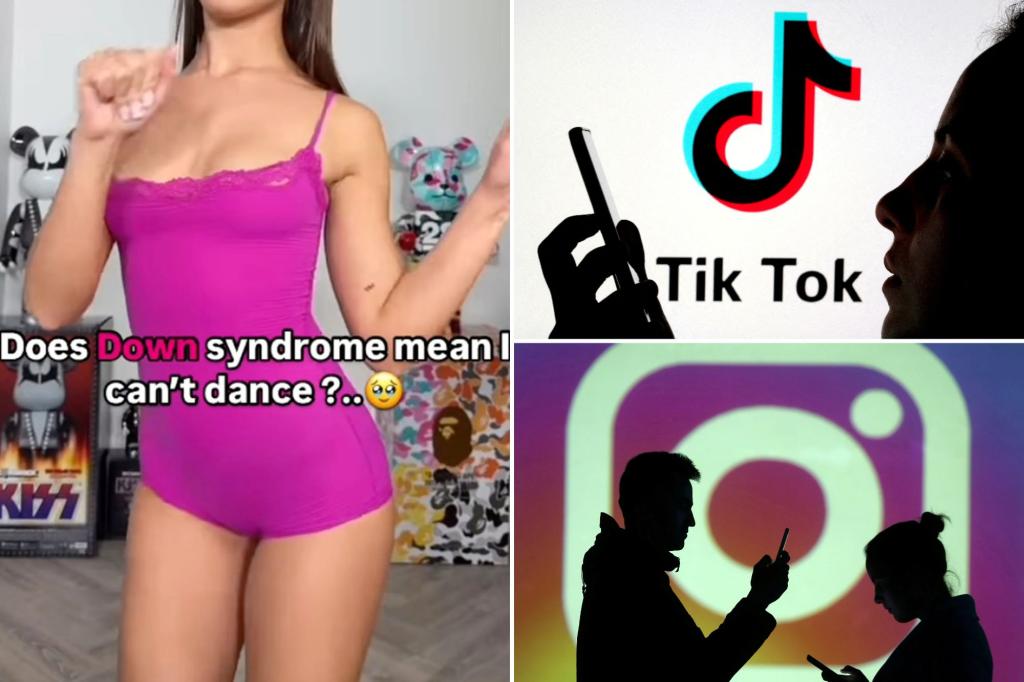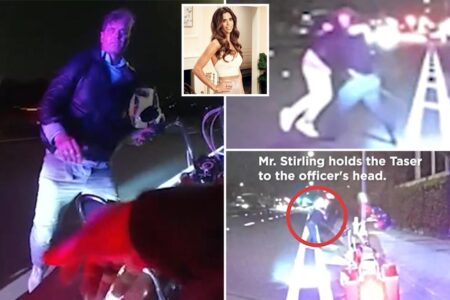Social media creators have been known to use AI filters to make their waists look smaller or their breasts appear bigger, but now disturbing Instagram and TikTok accounts are stooping to a far more disturbing trick to drive engagement.
In videos that are going viral on those platforms, typical facial features associated with Down syndrome are being superimposed over the faces of scantily clad women engaged in sexually suggestive behavior with artificial intelligence.
The posts — which often redirect users to OnlyFans accounts, other porn sites or Telegram groups — are getting hundreds of thousands of views a pop, and they have individuals with Down syndrome and disability advocates alarmed about fetishization and exploitation.
“It makes me feel a myriad of things,” Charlotte Woodward, a 35-year-old woman with Down Syndrome told The Post. “Not only do I find it disturbing, I find it personally upsetting. I also feel anger and outrage.”
Captions that go along with the posts are sexualized and exploitative.
Typical captions include, “Is Down syndrome a deal breaker for you?” ”Would you date a girl with Down syndrome?” or “Does Down syndrome change how you feel about me?” as well as others far more lewd.
Woodward, who works as a Programs Associate for the National Down Syndrome Society believes this sort of content puts people like her in harm’s way.
“I just feel as if it’s putting people with Down syndrome at risk of sexual abuse and sexual assault,” she worried.
It’s unclear who exactly is behind the dozens of Instagram and TikTok pages that have popped up in recent months to pump out this content, but most appear to steal videos from scantily-clad female stars then apply an AI filter to them over their faces.
Many different accounts names are using the same videos and linking to the same few OnlyFans accounts.
While it’s impossible to tell what platform these internet trolls are using to transform the faces, TikTok has multiple controversial Down syndrome filters available to users.
The Post reached out to TikTok for comment but did not hear back.
Undoubtedly, though, the creators behind these accounts are raking in money from the videos’ morbid sexual curiosity, between monetizing views and raking in OnlyFans subscriptions.
“The social media posts that are more sexual in nature are just exploiting disability for entertainment and clicks,” Kandi Pickard, CEO of the National Down Syndrome Society, told The Post. “Disability is not a trend.”
She’s had families of individuals with autism reach out upset and concerned about this trend over the past couple of months, as such content has exploded online.
“It’s been on our radar,” Packard says. “We’ve been really monitoring this surge in fake online social media accounts.”
As with so much of the internet, there’s apparently a real demand for this strange niche new content.
Instagram auto-fills searches for “down syndrome” by suggesting “beautiful girl” and “down syndrome dance,” which implies users are on the hunt for such content. They return endless pages of artificially generated, highly sexualized content.
“Our Community Standards apply to all content posted on our platforms regardless of whether it’s AI-generated, and we take action against any content that violates these policies,” a spokesperson for Meta, which owns Instagram, said.
OnlyFans’ rules on AI generated or enhanced content are that it can only be posted by registered creators and the content must feature that person and make clear to the viewer that AI is being used.
“Do I look cute even if I have Down syndrome,” a post asks. “Would my D syndrome not make your D hard,” another more direct one reads. “Syndrome is down but your d—k is up,” another quips.
Worse yet, down syndrome porn — both artificially generated and not — is available in dark crevices of the internet.
Pickard, who has a son with Down syndrome, says this is especially concerning, because it paints an inaccurate and ultra-sexualized vision of people with the condition.
“People with Down syndrome can find love, they can have kids, they can have sex,” she said. “These are all normal things. But this content is a lie to make money off of people with disabilities and people with Down syndrome.”
By contrast, creators who actually have Down syndrome, like Madison Tevlin, promote positive messages and de-stigmatizing content about people with the condition.
They prove that the reality of life with Down syndrome is a far cry from the one-dimensional, hyper-sexualized smut being pumped out by these accounts.
“Really what these videos are is ableism,” Woodward said. “It’s even worse than when non-disabled people use the r-word.”
Read the full article here







